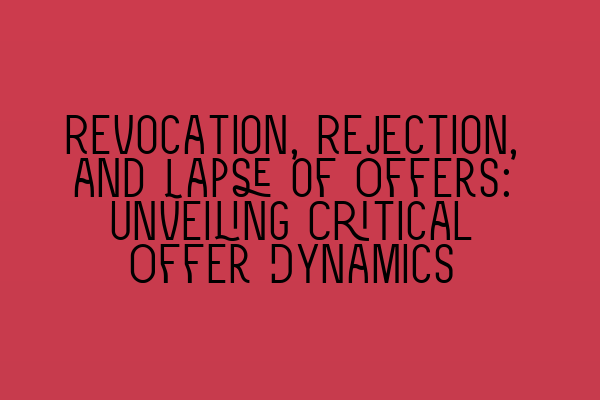Revocation, Rejection, and Lapse of Offers: Unveiling Critical Offer Dynamics
As a solicitor, understanding the intricacies of contract law is crucial to providing sound legal advice to your clients. One fundamental aspect of contract law is the concept of offers. The life cycle of an offer involves various stages such as revocation, rejection, and lapse. In this blog post, we will delve into these critical offer dynamics and shed light on their implications in the legal realm. So, let’s dive in!
Revocation of Offers: Is it as Simple as it Seems?
Revocation refers to the act of withdrawing an offer before it is accepted. While it may sound straightforward, the timing and communication of revocation can significantly impact its validity. In general, an offer can be revoked at any time before it is accepted, but this revocation must be communicated effectively to the offeree.
It’s important to note that revocation can take multiple forms. It can be explicit, where the offeror directly communicates the revocation to the offeree. For example, by sending a written notice of revocation. However, it can also be implicit, where the offeror engages in conduct that clearly indicates their intention to revoke the offer. In such cases, the offeree must be made aware of these actions for the revocation to be effective.
It’s crucial to advise your clients on the proper procedures for revocation to ensure their actions align with legal requirements and minimize the risk of disputes. With this understanding, you can help your clients navigate the revocation process swiftly and effectively.
Rejection: The Power of Saying No
Rejection, on the other hand, occurs when the offeree declines the offer. It is important to note that rejection can be explicit or implicit. An explicit rejection is when the offeree directly communicates their refusal to accept the offer. This can be done in writing or orally, depending on the circumstances.
Implicit rejection, on the other hand, occurs when the offeree engages in conduct that clearly indicates their lack of intention to accept the offer. For example, if the offeree takes actions that are inconsistent with accepting the offer or proposes counter-offers, it can be seen as an implicit rejection.
It is essential to advise your clients on the appropriate manner of rejection to prevent any misunderstandings or potential claims of breach of contract. By providing guidance on explicit communication and the implications of implicit rejection, you can empower your clients to make informed decisions.
The Lapse: When Offers Run Out of Time
The third stage in the life cycle of an offer is the lapse. A lapse occurs when an offer expires or becomes invalid due to the passage of time or the occurrence of certain events. In general, an offer lapses after a reasonable period of time if it is not accepted by the offeree.
However, it’s important to consider various factors that can impact the determination of a reasonable period. These include the nature of the offer, industry practices, and any specific terms outlined within the offer itself. Additionally, certain events, such as the death or incapacity of either the offeror or offeree, can also lead to the lapse of an offer.
Advising your clients on the various factors that can contribute to the lapse of an offer is essential to ensure they understand the importance of timely acceptance and the potential risks associated with delays.
In Conclusion
Understanding the dynamics of revocation, rejection, and lapse of offers is vital for any solicitor practicing contract law. By providing your clients with comprehensive guidance on these critical offer dynamics, you can help them navigate potential pitfalls and ensure their actions align with legal requirements.
If you found this article informative, you may also enjoy reading our related articles:
Navigating Legal Challenges and Pitfalls in Your Practice
Barrister vs. Solicitor: A Comprehensive Comparison
Understanding the SRA Competence Statement: A Guide for Solicitors
Exploring Different Solicitor Specializations: Finding Your Niche
Top Recommendations for Law Schools in the UK
Remember, knowledge is power, and in contract law, it can make a substantial difference in the outcomes for your clients. Stay informed, stay empowered!
